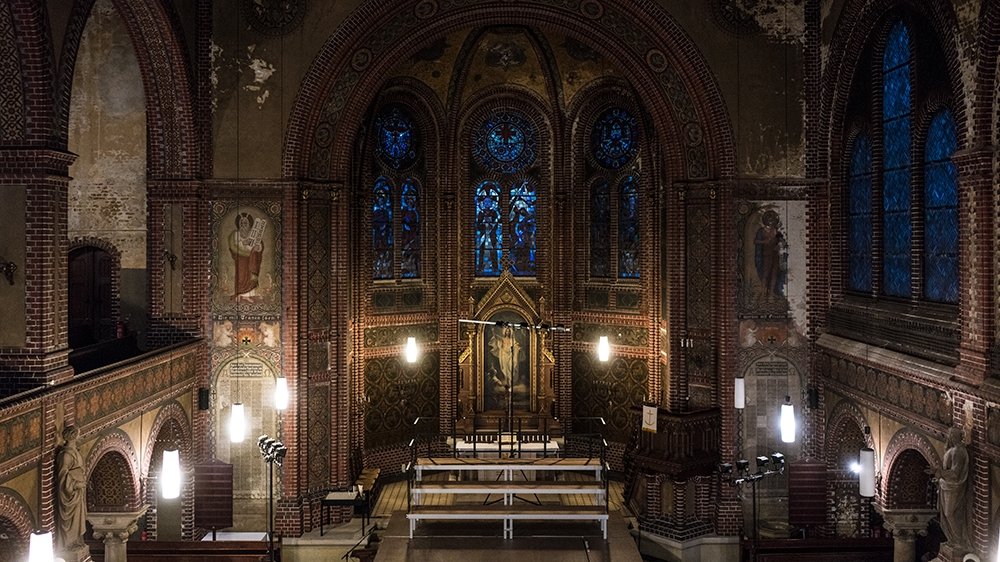Germany
German Churches Confront Racial Challenges Within Christian Communities

German Churches Confront Racial Challenges Within Christian Communities:
German Christian groups addressed racism at a crucial Frankfurt meeting. Racism victims spoke up during the Week of Prayer for Christian Unity’s primary service. The National Council of Churches (ACK) and regional church councils hosted the service at Freie Evangelischen Gemeinde Frankfurt, drawing church leaders nationwide.
Overflowing attendance underlined the need to address racial concerns in religious places. Greek Orthodox archpriest Radu Constantin Miron, the ACK Germany chairman, opened the ceremony by highlighting the need for churches to manage their histories. Miron’s exhortation to wake up from complacency and self-righteousness reverberated, prompting Christian groups to reflect.
Pastor Stefanie Bohn of Frankfurt-Sachsenhausen echoed Miron, urging Christians to examine their influence. Her insights highlighted hidden daily racism in the church and called for a change in thinking, structures, and organization. Bohn called for a “safe space” in churches where people with shared experiences may heal and process. Her appeal for action stressed the need to challenge racism in religious organizations and encourage reform.
Unity Amidst Diversity: A City’s Stand Against Racism
The event City Councilor Bernd Heidenreich attended showed society’s solidarity and anti-racism efforts. Frankfurt is Germany’s most international city, and Heidenreich praised Christians worldwide. The city’s multicultural togetherness and fight against racism represent a more extensive social narrative.
As German churches face racism, this unified front shows Christian communities’ standard duty. Week of Prayer for Christian Unity is a crucial time for prayer and action to make German churches more inclusive and racially sensitive.
Acknowledging Historical Guilt And Seeking Transformation
Greek Orthodox archpriest Radu Constantin Miron, the ACK’s Germany chairman, stressed that all churches must examine their pasts. His painful insights into his background exemplified the larger problem churches face in confronting their past.
Historical assessments do not necessarily yield “glory sheets.” Miron warned against sanitizing history. Miron, using the Black Lives Matter phrase “woke,” challenged churches to rise from ‘dead Christianity.’ He said this requires overcoming security and self-righteousness slumber. By critically examining their historical narratives, churches may help eliminate racial prejudices and create a more inclusive atmosphere.
Empowering Voices: A Pastor’s Call For Systemic Change
Pastor Stefanie Bohn’s discourse stressed Christians’ need to challenge their church leadership. Bohn spoke to the group about her own experiences with hidden racism in the church.
Bohn’s church-wide shift required changing ideas, structures, and organizational paradigms. By questioning power dynamics, the church may help end racial stereotypes. Bohn proposed a ‘ safe zone,’ where others with comparable racist experiences may discuss and process their experiences. She believed this was necessary to create a more compassionate Christian community.
Read Also: Germany’s Hidden Struggle With Anti-black Racism
Facing The Painful Reality: A Commitment To Change
Brigitte Görgen-Grether, ACK Hessen-Rheinhessen chair, agreed with Bohn that churches must pay more attention to intolerance and prejudice. Görgen-Grether recalled Isaiah’s warning to strive as an ecumenical duty to address white people’s sad history of guilt.
Görgen-Grether’s demand for reform stressed that reconciliation begins with addressing the terrible past. Christians may create a more accepting and compassionate church by aggressively addressing bigotry and intolerance. The Old Testament prophet’s devotion to searching guides church racial prejudice removal.
Voices Of Awareness: Tackling Everyday Racism In Church Spaces
Pastor Annegreth Schilling stressed that even in church groups, individuals are discriminated against and ostracized based on their skin color, religious affiliation, language, or culture during the holy service. Schilling noted that discriminatory behaviors and ideas are often ignored, resulting in unintentional exclusion.
Schilling, ACK Frankfurt’s chairman, stressed that the church’s development and inclusiveness depend on admitting and overcoming prejudice. Churches may foster equality and understanding by facing daily discrimination. This acknowledgment may lead to a more welcoming religious atmosphere.
City Council’s Praise: Frankfurt’s Commitment To Unity And Diversity
City Councilor Bernd Heidenreich welcomed guests and thanked the heavenly service at the reception. Heidenreich praised Christians worldwide for protecting human dignity. Heidenreich, the former head of the Hessian State Centre for Civic Education, stressed Frankfurt’s status as Germany’s most cosmopolitan metropolis.
The municipal councilor said Frankfurt’s lifeblood is togetherness in diversity and fighting bigotry. Heidenreich’s statements showed the church’s initiative’s more significant social impact, showing how religious and civic efforts to remove racial prejudices are intertwined.
Praying For Unity Beyond A Week
The Week of Prayer for the Unity of Christians, held January 18–25, symbolizes church unity. Proposed in 1908, this time illustrates St. Peter and St. Paul feasts. The church’s commitment to racial concerns is shown by its yearly pledge.
Due to the necessity for flexibility, the World Council of Churches supports using materials year-round to proclaim church communion and pray for Christ’s perfect oneness. Christian communities worldwide must resist racism year-round, as this global call to action shows.
Challenges And Opportunities: Navigating Racism In Churches
Church racism presents complex issues. As the divine service progressed, it became clear that acknowledging these problems is essential to development. The speakers, from many religions, highlighted historical guilt, underlying racism, and structural transformation.
Fighting racism is difficult, but it offers progress and inclusiveness. Christian communities may create a more compassionate and understanding future by facing past narratives and addressing racism in church settings. Racism drives change, allowing churches to rewrite their stories and welcome diversity.
This coordinated position against racism among German churches affects more than the Frankfurt community center. The recognition of racism in religious settings and the communal determination to confront it set off a ripple effect that affected Germany and the worldwide Christian community.
The service’s calls for self-reflection, structural reform, and safe places inspire other churches confronting similar issues. The Week of Prayer for the Unity of Christians is a global call to action that unites Christian communities worldwide. Frankfurt symbolizes an international church movement to address prejudice and strive toward a more inclusive and peaceful future for all Christians. This worldwide endeavor highlights the Christian community’s cooperation in fighting racism.












You must be logged in to post a comment Login